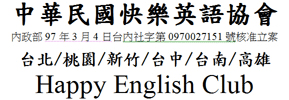網站 http://www.happyforum.org/ 歡迎超連結並轉寄網址
論壇 http://www.happyforum.org/happy/ 歡迎至論壇討論
Time:第208次例會,2009年05月23日(週六)下午14:30-17:30 [高雄 18:00-21:00]
Place:
viewtopic.php?t=15
14:30~15:20 Session I: Topic Discussion Q1-Q3 + Chat
15:20~15:30 Session I Feedback
15:30~15:50 Speaker Session
15:50~16:00 Change Group + Break
16:00~17:00 Session II: Topic Discussion Q4-Q6 + Chat
17:00~17:15 Session II Feedback
17:15~17:30 Happy Time
Taipei Dinner Location
Taipei Host: Dustin Hsu / Speaker: Dustin Hsu / Photographer: Brian Huang / Happy Time: Stanley Liu / Gourmet: Stanley Liu
Some Thoughts on the Lost Art of Reading Aloud
[ATTENTION: BECAUSE OF COPYRIGHT CONCERNS, WE CANNOT REPRODUCE THE WHOLE ARTICLE HERE. PLEASE VISIT THE SOURCE TO READ AND PRINT THE ENTIRE ARTICLE]
Source: http://www.nytimes.com/2009/05/16/opini ... l?_r=1&hpw
Sometimes the best way to understand the present is to look at it from the past. Consider audio books. An enormous number of Americans read by listening these days — listening aloud, I call it. The technology for doing so is diverse and widespread, and so are the places people listen to audio books. But from the perspective of a reader in, say, the early 19th century, about the time of Jane Austen, there is something peculiar about it, even lonely.
In those days, literate families and friends read aloud to each other as a matter of habit. Books were still relatively scarce and expensive, and the routine electronic diversions we take for granted were, of course, nonexistent. If you had grown up listening to adults reading to each other regularly, the thought of all of those solitary 21st-century individuals hearkening to earbuds and car radios would seem isolating. It would also seem as though they were being trained only to listen to books and not to read aloud from them.
It's part of a pattern. Instead of making music at home, we listen to recordings of professional musicians. When people talk about the books they've heard, they're often talking about the quality of the readers, who are usually professional. The way we listen to books has been de-socialized, stripped of context, which has the solitary virtue of being extremely convenient.
But listening aloud, valuable as it is, isn't the same as reading aloud. Both require a great deal of attention. Both are good ways to learn something important about the rhythms of language. But one of the most basic tests of comprehension is to ask someone to read aloud from a book. It reveals far more than whether the reader understands the words. It reveals how far into the words — and the pattern of the words — the reader really sees.
------------------------------------
Questions:
Session I
1. Do you still read books aloud? When is the last time you read something aloud to another person?
2. Do you agree with the author of this article that listening to audio books is a lonely experience? Do you think we have been "trained only to listen to books and not to read aloud from them"?
3. Do you think reading aloud Chinese books and articles helped you learn Chinese faster as a child? What about for English books and articles? If the schools you attended did not emphasize on reading aloud in English, did you think this slowed your progress in English learning?
Session II
4. Do you agree with the author that "reading aloud recaptures the physicality of words. To read with your lungs and diaphragm, with your tongue and lips, is very different than reading with your eyes alone"?
5. Do you think the electronic conveniences we have today made us less social than years ago? For instance, people riding in public transportation often are more occupied with listening to music or audio books.
6. Do you remember any movies in which reading aloud plays a role in the films? Some examples would be The Reader 為愛朗讀 starring Kate Winslet, I am Sam 他不笨,他是我爸爸 starring Sean Penn, Shakespeare in Love 莎翁情史 starring Gwyneth Paltrow, and Adaptation. 蘭花賊 starring Nicolas Cage. How did reading aloud impact the characters in these films?
例會須知
參與例會,請自行列印當週的討論文章並帶至現場,圖示如下:

請將社團網站,加入我的最愛
http://www.happyforum.org/
新竹,每週六 230-530 PM
Hsinchu, every Saturday
Place:
viewtopic.php?t=15

台中,每週六 230-530 PM
Taichung, every Saturday
Place:
viewtopic.php?t=15

高雄,每週六 6-9 PM
Kaohsiung, every Saturday
Place:
viewtopic.php?t=15

台北,每週六 230-530 PM
Taipei, every Saturday
Place:
viewtopic.php?t=15


















